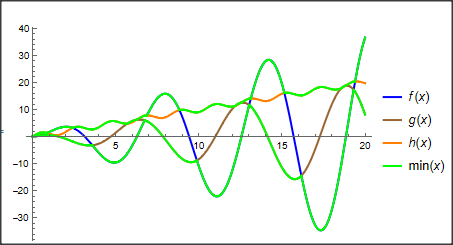Assume that I have three one-variable non-periodic functions $f(x),g(x),h(x)$ for $x>0$. The question is: is it possible to ask Mathematica to obtain the function describing the upper and lower boundaries of these three functions (I am not sure if it is called enveloping function)? Something like the red curves in the second picture attached (I plot it manually); I am looking for an analytic expression for the function describing these red curves.
f[x_] = 2 x Sin[x];
g[x_] = x Cos[x];
h[x_] = x + Sin[3 x];
Plot[{ f[x], g[x], h[x]}, {x, 0, 20}, PlotLegends -> "Expressions"]
P.S. This is just a simple example, my real functions are much more complicated than the given ones; I just wanted to know if there is any hope to do that.


